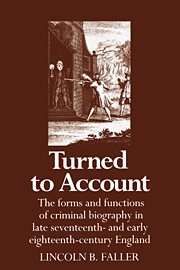 Turned to Account
Turned to Account Book contents
- Frontmatter
- Contents
- Preface
- Part I Turning criminals to account: three case histories and two myths of crime
- Part II Enucleating the truth: the criminal as sinner turned saint
- Part III Palliating his crimes: the thief as various rogues
- Postscript: Criminal biography and the novel
- Appendix I Who read the popular literature of crime?
- Appendix II The politics of thieving
- Notes
- Select bibliography
- Index
Part II - Enucleating the truth: the criminal as sinner turned saint
Published online by Cambridge University Press: 05 February 2012
- Frontmatter
- Contents
- Preface
- Part I Turning criminals to account: three case histories and two myths of crime
- Part II Enucleating the truth: the criminal as sinner turned saint
- Part III Palliating his crimes: the thief as various rogues
- Postscript: Criminal biography and the novel
- Appendix I Who read the popular literature of crime?
- Appendix II The politics of thieving
- Notes
- Select bibliography
- Index
Summary
Since thou are to die for the evil thou hast committed, endeavour to do good before thy Death…. And a principal inducement hereunto would it be, if you would make publick to the world, your carriage from your Cradle to your Death…. [B]y your ingenious Confession … satisfie the world that are yet unsatisfied.
Blood Washed Away by Tears of Repentance (1657), pp. [xii–xiv]Under a sense of that Horrid and Hellish Sin of Murther, which I lately committed, I desire to leave to the World this following Treatise. First, the Cause of my Provocation: Secondly, the manner in brief of the Murther: And thirdly, my hearty and unfeigned sorrow for my Offence, which I hope may stand as a Monument to succeeding Ages.
Mary Hobry [supposedly], A Cabinet of Grief (1688), p. 1I have now done with the Introduction to this tragick and dismal story, having unravelled as many of those, almost occult causes, by which being first propagated, it since hath been made horridly publick, as civillity or necessity in enucleating the truth requires.
The Unhappy Marksman (1659), p. 10New, new, new, and true; is now adayes (to ordinary Readers) an authentication sufficient, for Relations of this or the like nature. But Reader it is the Cry of Blood, of Blood! Therefore more Seriousness becomes our pen: in the perusal of this Relation, thou shalt in a chain of dependencies read the Truth, the whole Truth, and nothing but the Truth.
A Full and the Truest Narrative of the Most Horrid, Barbarous and Unparalleled Murder (1657), pp. [iii–iv] […]- Type
- Chapter
- Information
- Turned to AccountThe Forms and Functions of Criminal Biography in Late Seventeenth- and Early Eighteenth-Century England, pp. 43 - 51Publisher: Cambridge University PressPrint publication year: 1987


